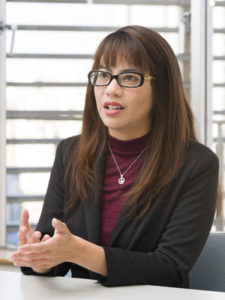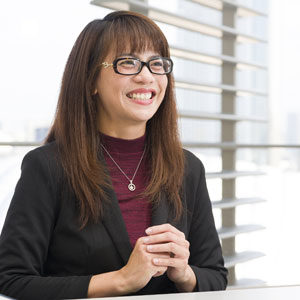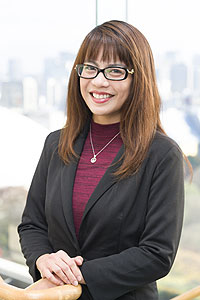ローレン・ローズ・ロサレス・タニャグさん Lauren Rose Rosales Tanyag
2015年度秋期コース/富士通奨学生
母国の司法制度へのアクセスを向上させる方法をプログラムを通して創り上げることができました
Profile
弁護士
Interview
弁護士、法学教授、そしてフィリピンの法律扶助センター(Legal Aid Center)の責任者としても活躍されているローレン・ローズ・ロサレス・タニャグさん。ローレンさんはその活動の中で母国の司法制度の多くの不公平さを目の当たりにしてきました。司法制度はそれ自体が費用のかかる特権的なものであるため、フィリピンの貧しい人たちは法定代理人による十分な法律業務にアクセスすることがほぼ不可能な状態にあります。こういった状況から、法的争議や訴訟で十分な代理人を立てられない多くの人たちにとって、公平な裁判は総じて手の届かないものになっています。GLIKに参加したローレンさんは、タイ、シンガポール、日本、ハワイなど他地域の法律扶助システムについての知識を深め、「フィリピンの司法へのアクセスを向上させる方法を検討する」という、自身のキャップストーンプロジェクトを推し進めました。この取り組みは母国の貧困層の生活を大きく向上させ、司法制度へのアクセスを容易にする、大きな可能性を秘めたものだとローレンさんは確信しています。
―キャップストーンプロジェクトは、どのような内容ですか?また、フィリピンの司法へのアクセスについて取り組むことが重要だと感じたのはなぜですか?
 私のキャップストーンプロジェクトは司法へのアクセスについてです。これはひとつの地域に限定された問題ではなく、世界のどこへ行っても同じ困難に直面している人たちがいることから、極めて適切なトピックだと感じました。司法サービスに多額の費用がかかるという事は周知の事実ですが、残念ながら多くのフィリピン人たちは貧困ラインぎりぎりの生活をしています。法律扶助センターには、自分で弁護士費用を払う手だてを持たない人たちが助けを求めて頻繁にやって来るのですが、こういった人たちは大抵、何か問題が起こった時には訴訟を起こさなければならないと考えているのです。しかし実は訴訟を起こさなくても、他に法律的に利用できる仕組みがたくさん存在し、しかもお金を払う必要すらないのですが、こういった人たちはその事実を知りません。お金をかけずに利用できる救済策がすでにあることを人々に広く知ってもらうこと、これが私のキャップストーンプロジェクトの目的の一つです。どこに行って何をすれば良いのかを知ってさえいれば、司法は必ずしも高額というわけではないのです。
私のキャップストーンプロジェクトは司法へのアクセスについてです。これはひとつの地域に限定された問題ではなく、世界のどこへ行っても同じ困難に直面している人たちがいることから、極めて適切なトピックだと感じました。司法サービスに多額の費用がかかるという事は周知の事実ですが、残念ながら多くのフィリピン人たちは貧困ラインぎりぎりの生活をしています。法律扶助センターには、自分で弁護士費用を払う手だてを持たない人たちが助けを求めて頻繁にやって来るのですが、こういった人たちは大抵、何か問題が起こった時には訴訟を起こさなければならないと考えているのです。しかし実は訴訟を起こさなくても、他に法律的に利用できる仕組みがたくさん存在し、しかもお金を払う必要すらないのですが、こういった人たちはその事実を知りません。お金をかけずに利用できる救済策がすでにあることを人々に広く知ってもらうこと、これが私のキャップストーンプロジェクトの目的の一つです。どこに行って何をすれば良いのかを知ってさえいれば、司法は必ずしも高額というわけではないのです。
また、弁護士の仕事は裁判に出向くことだと思っている人がたくさんいます。何かしら問題を抱えてしまった時にはじめて弁護士のことを考える人が多いということです。しかし日々の生活の中で行う取引はすべて法的問題に発展するリスクをはらんでいて、そのことに気付いている人はそう多くありません。アプリの同意画面で「同意」をクリックするというようなシンプルなことでも法律的な問題になるかもしれません。家を借りたり不動産を買う際に交わす契約書にしても、署名をすることで法的な問題にさらされる可能性があります。つまり司法へのアクセスというのは、私たちの日常生活にとても深く関わってくる問題なのです。
―フィリピンの貧困層の人たちにとって法的代理人による適切な法律業務にアクセスするのはどれほど難しいことですか?
費用の面で極めて困難です。弁護士費用が非常に高額であるということは私も認めざるを得ません。弁護士費用を抜きにしても、裁判所に払う訴訟申立手数料というものが、また高額です。訴訟が進むに従って、それぞれの段階でまた費用が必要になります。一番低いレベルで訴訟を申し立てた時にまず費用がかかります。それに勝訴したとしても、相手方が上訴した場合には、次のレベルに持ち上がり、またそこでいくらかのお金を払わなければなりません。最高レベルに上がるまで費用を払い続ける覚悟が必要になります。訴訟費用を工面するためだけに家を抵当に入れなければならない人もいます。
悲しいのは、最初から裁判に持ち込む必要のない人もいるという現実です。現在は調停といったような代替的な方法を使って争議を解決する傾向にありますが、こういった別の方法の存在を知っている人が少ないのが実情です。単に道義的な理由(例えば、相手方に思い知らせてやりたいというような理由)から裁判に持ち込む人もいます。しかしもし、互いに顔を合わせて話し合える手段があるなら、そして私たちが間に立って問題を次のレベルにエスカレートさせないようにできるなら、費用も少なくて済み、負担も悩みも少なく、安心して夜もぐっすりと眠れるようになるはずです。
―キャップストーンプロジェクトの中で、夫から虐待を受けているにも関わらず離婚する金銭的余裕がないフィリピン女性について言及していますが、司法制度が不公平に働いて、女性側が不当に負担を強いられていると感じますか?
特にそうは思いません。私は制度の負担は平等だと考えています。ただ多くの女性たちが未だ夫に依存していることから、そう思われることもあるかもしれません。フィリピンは非常に家父長的な社会なので、働く女性やキャリアを積む女性の数は増えているものの、いったん結婚して子どもを産むと、家に入って家族の世話をするべきとする考えが未だにあります。そういう意味からいえば、女性は不利な立場にあると言えるかもしれません。しかし負担という面においては、やはり全員が同等に背負っていると考えます。
―プロジェクトのミッションとして「教育を通じて人々が自分で問題を解決できるよう手助けする」ことを挙げていますが、どのようなことでしょうか?
 現在の制度は、生活困窮者に対して法律扶助センターが無料で代理人による法律業務を提供するというものです。しかし私たちには、裁判に際して自分で弁護士を雇えない人の代理を務めることしか法的に認められていません。簡単に言えば、裁判目的の制度なのです。しかし先ほどお話ししたように、裁判所に行かなくても争議を解決できる方法がたくさんあります。ここで私のプロジェクトの出番となるわけです。私は、法律扶助センターのネットワークを構築して機能拡大を図り、研究、擁護、教育のすべてを含有したいと考えました。訴訟を回避できる救済策があり、それを活用することができるのだということを人々に教えることができれば、一番早い段階で問題や争議を解決できるようになるはずです。
現在の制度は、生活困窮者に対して法律扶助センターが無料で代理人による法律業務を提供するというものです。しかし私たちには、裁判に際して自分で弁護士を雇えない人の代理を務めることしか法的に認められていません。簡単に言えば、裁判目的の制度なのです。しかし先ほどお話ししたように、裁判所に行かなくても争議を解決できる方法がたくさんあります。ここで私のプロジェクトの出番となるわけです。私は、法律扶助センターのネットワークを構築して機能拡大を図り、研究、擁護、教育のすべてを含有したいと考えました。訴訟を回避できる救済策があり、それを活用することができるのだということを人々に教えることができれば、一番早い段階で問題や争議を解決できるようになるはずです。
―GLIKでは4カ国でフィールドワークを行いますが、キャップストーンプロジェクトにどのように役立ちましたか?
私がGLIKに参加した一番の理由は、コース概要に大きな関心を持ったからです。知っていることから皆目見当がつかないことまで、いろいろ混ざり合った内容でした。私は法律扶助センターの運営を行っていますが、マネジメント分野でのバックグラウンドは全く持ち合わせていません。
シンガポールとタイでは、日本モジュールIとハワイモジュールで学んだ事が実際に適用されているのを見ることができました。講義を聴いて事前課題を読むのは簡単なことです。しかし私たちはシンガポールとタイに行って実際にそれがどのように適用されているかを直接体感し明確に理解することができたのです。
―プログラムの実践事例の部分も有益だったということでしょうか?
はい。学びは四角い教室の内側だけに制限されるべきものではないですから。私にとって実践事例を見る機会は単に講義を聴くより貴重なものでした。
―クラスメイトとの交流がどのような形でプロジェクトに役立ちましたか?
とてもフレンドリーで、協力的で、文化の違いを尊重してくれるクラスメイトに恵まれました。物事への取り組み方にしても、人によってやり方が違う事もあるということを十分に心得ている人たちで、みんなとてもオープンマインドでした。何か理解できない事があり、助けが必要な時は、分からないから助けてと気軽に言えましたし、どのような小さなことでも、たとえ個人的なことでも、必要な時には、いつもそこにいて助けてくれました。最後の方はいつも一緒にいるような状態で、まるで互いを家族のように思いあうような関係でした。
ここで学んだコンセプトに、ワイガヤというものがあります。ブレーンストーミングのようなものですが、これが私にとっても私のプロジェクトにとっても、とても役に立ちました。他者の視点、特に法律のバックグラウンドの無い人たちからの意見を聞くことができたからです。クラスに弁護士は私一人だったということもあり、プロジェクトの中で挙げた問題に対して、クラスメイトが別の視点から出してくれた意見は、プロジェクトを完成させる上で非常に貴重なものとなりました。
また「‘ba’を創造する」ことについても学びました。ワイガヤは、意見交換しようと予めスケジュールを組んで行うこともありましたが、ごく自然にワイガヤが始まることもありました。アイデアを出し合ったり、各自の関心事について話し合ったりするのに、わざわざフォーマルな体制を整える必要はなく、単にカジュアルな‘ba’を創造するだけで良いというのも、かけがえのない学びでした。
―‘ba’とはどういう意味ですか?
最初は‘ba’とは人が集まってコミュニケーションする「場所」を指す言葉だと思っていましたが、プログラムを通して、これは単に「場所」そのものを指す言葉ではなく、人が集まって考えやアイデアを交換する仕組み、あるいは手法というような意味だと理解するようになりました。
―最終的に、キャップストーンプロジェクトがフィリピンのコミュニティの向上に貢献すると思いますか?
はい、そう確信しています。もちろん本当に実践できればの話ですが、大きな期待を抱いています。すでにこの事について上司とも話をしています。
プログラムの一環でハワイに滞在中、‘Legal Aid Society of Hawaii’について知ることができました。ハワイでは、地域のいろいろな場所を訪れるというコースがあり、その中の一つにハワイ最高裁判所があったのですが、そこで配られていたリーフレットの中に‘Legal Aid Society of Hawaii’の広告を見つけたのです。そこは無料サービスの他に、貧しい人たちのための教育プログラムも提供していました。そのプログラムは、セミナーを開催して、正式な教育を受けていない人たちでも理解できる簡単な言葉で訴訟手続について説明するといったような内容で、私がフィリピンでやりたいことにとても近いものでした。これをある種のモデルとして活用できたという点でとても有意義なものでした。それをそのまま真似るのではなく、システムの長所を取り入れ、悪い部分を取り除き、より改善できる点がないかどうか検討するという形で活かすことができました。
―GLIKを短い言葉で要約するなら、どう表現しますか?
 GLIKは「偉大な学びの体験」と言えると思います。学びの体験とは、単に講義や課題を通して新しい知識を吸収するだけに留まりません。それと同時に、人間としての成長、つまり職の専門性で定義されるのではない、それ以上の、人として成長するために学ぶ体験でもあると思います。何よりも私を人間的に大きく成長させてくれたのが、スタッフやクラスメイトとの交流でした。今までの私には、箱の中に押し込められているような、完全に出口を塞がれたような感覚がありました。しかしGLIKが私の視野を大きく広げる契機となり、目の前にあるものだけではなく、その先までも見据えることができるようになりました。
GLIKは「偉大な学びの体験」と言えると思います。学びの体験とは、単に講義や課題を通して新しい知識を吸収するだけに留まりません。それと同時に、人間としての成長、つまり職の専門性で定義されるのではない、それ以上の、人として成長するために学ぶ体験でもあると思います。何よりも私を人間的に大きく成長させてくれたのが、スタッフやクラスメイトとの交流でした。今までの私には、箱の中に押し込められているような、完全に出口を塞がれたような感覚がありました。しかしGLIKが私の視野を大きく広げる契機となり、目の前にあるものだけではなく、その先までも見据えることができるようになりました。
Learning to expand access to justice in the Philippines
Fujitsu Scholar on the 2015 Fall Course:
Lauren Rose Rosales Tanyag
Lawyer
As a lawyer, law professor and director of a Legal Aid Center in the Philippines, Lauren Rose Rosales Tanyag has witnessed many inequalities in the country’s legal system. Due to the expensive and exclusive nature of the system, poor people in her homeland have little access to adequate legal representation. This puts justice out of reach for many people, who are under-represented in legal disputes and litigation in general. However, while taking part in the Global Leaders for Innovation and Knowledge program, Lauren was able to find out more about legal aid systems in jurisdictions such as Thailand, Singapore, Japan and Hawaii. This helped her develop her capstone project that examined ways of improving access to justice in the Philippines. Lauren believes this work has the potential to greatly improve the lives of the poor in her home country and provide better access to the justice system.
―Please describe what your Capstone Project was and why you feel studying access to justice in the Philippines was important.
 My Capstone Project was about access to justice and the reason I felt that it is very relevant is because this problem is not limited to just one locality. It’s a problem being experienced everywhere in the world. It’s a known fact that legal services are quite expensive and, unfortunately, so many Filipinos are living at the margins of poverty. Through the Legal Aid Center, I am often exposed to people who come to us for help because they lack the means to pay for a lawyer of their own choice. More often than not, they come to us thinking that when they have a problem, they have to go to court. They are not aware that there are so many mechanisms in place under the law that they could take advantage of that would not cost them anything. So that is one of the purposes of my Capstone Project, to educate the people for them to know the remedies that are already available which will not translate to any costs for them. Justice does not have to be expensive, but only if you know where to go and what to look for.
My Capstone Project was about access to justice and the reason I felt that it is very relevant is because this problem is not limited to just one locality. It’s a problem being experienced everywhere in the world. It’s a known fact that legal services are quite expensive and, unfortunately, so many Filipinos are living at the margins of poverty. Through the Legal Aid Center, I am often exposed to people who come to us for help because they lack the means to pay for a lawyer of their own choice. More often than not, they come to us thinking that when they have a problem, they have to go to court. They are not aware that there are so many mechanisms in place under the law that they could take advantage of that would not cost them anything. So that is one of the purposes of my Capstone Project, to educate the people for them to know the remedies that are already available which will not translate to any costs for them. Justice does not have to be expensive, but only if you know where to go and what to look for.
So many people think that the job of a lawyer is to go to trial. When they’re already having problems, that’s when they think of lawyers. But the thing is, not many people realize that we are exposed to the risk of incurring or having legal problems in almost every transaction. As simple as clicking ‘I agree’ in an app agreement could expose you to legal problems. If you’re renting a house or buying a property, you sign a contract and that act could expose you to legal problems too. So access to justice is something that is very relevant in our daily lives.
―How difficult is it for the poor to get proper legal representation in the Philippines?
Oh, quite difficult, because lawyers’ fees, I have to admit, are quite expensive. And, even if we take that out of the equation, the expenses for filing a case in court—the filing fees —are also costly. At every stage of the proceedings, you have to spend money. When you file a case at the lowest level, you have to pay. Assuming you win, if the other party appeals the case, it will be elevated to the next level and again some amount shall have to be paid. Until you reach the highest level, you have to be ready for expenses. Some people have to mortgage their houses just to afford litigation.
The sad reality is, some of them don’t even have to go to court. Right now, the trend is to avail of alternative modes of dispute resolution, like mediation. However, not many people are aware of alternative modes of dispute resolution. Sometimes people go to court just as a matter of principle. They want to teach the other person a lesson. However, if only they have a means to meet and talk—for us to mediate the problem so it does not escalate—that would translate to less expense for them, less burden and trouble, so they would be able to sleep better at night.
―Your Capstone Project refers to women who are victims of abuse but unable to afford the costs of divorcing their partners in the Philippines. Because of this, do you feel women are unfairly burdened by the inequality of the legal system?
I would say not really. I think the burden of the system is shouldered equally. But maybe it’s because many women are still dependent on their husbands. In the Philippines, we are very patriarchal. So, although the number of women who are working or who have careers is increasing, it is still expected that once a woman gets married and has children that she will stay at home and take care of the family. So in that sense, maybe women are disadvantaged. But I would still say that the burden is shouldered by all equally.
―Your project also states that your mission is to “help people help themselves through education”. Can you explain what you mean?
 The existing system right now is that we have Legal Aid Centers which provide free legal representation to indigents. However, our only authority under the law is to represent those who cannot afford their own lawyer in court. To put it simply, for trial purposes. However, like I said earlier, there are so many means by which disputes can be resolved without going to court. That’s where this project comes in. I wanted to build a network of Legal Aid Centers, as well as expand its functions so that it would include research, advocacy and education. If we are able to educate the people about the remedies which are available to them to avoid litigation, they would be able to resolve issues or disputes at the earliest instance.
The existing system right now is that we have Legal Aid Centers which provide free legal representation to indigents. However, our only authority under the law is to represent those who cannot afford their own lawyer in court. To put it simply, for trial purposes. However, like I said earlier, there are so many means by which disputes can be resolved without going to court. That’s where this project comes in. I wanted to build a network of Legal Aid Centers, as well as expand its functions so that it would include research, advocacy and education. If we are able to educate the people about the remedies which are available to them to avoid litigation, they would be able to resolve issues or disputes at the earliest instance.
―The program allows you to do field work in four different countries. How did this help your Capstone Project?
I came into this program primarily because I was very interested in the course outline. It’s a mix of the things that I know and things that I have no idea whatsoever about. I am managing a Legal Aid Center but I don’t have any background in management. So that is one of the reasons I joined the program.
In Singapore and Thailand, I got to see the application of the things we learned in Japan Module I, and the Hawaii Module. It’s easy to listen to lectures and read the pre-assignments, but to actually realize how they were applied—we got to see that firsthand when we went to Singapore and Thailand.
―So the hands-on portion of the program is also invaluable?
Yes, because learning should not be limited to the four corners of a classroom. The practical application, for me, is more valuable than just listening to lectures.
―How did interaction with your classmates help you with your project?
The thing about my classmates is that they were very friendly, helpful, and very respectful of cultural differences. They were very aware that there are some things that we handle differently. They were very open-minded. It was quite easy for me to tell them that there were some things I did not understand and that I would need help with. They were always there to give assistance, no matter how small the issue was or no matter how personal. Towards the end, we have become clingy. We treated each other like family.
We have this concept that I learned here, the Y-gaya, which is like a brainstorming session. Y-gaya was very helpful to me and for my project, because I got to hear other perspectives, especially from those who have no background in law. I was the only lawyer in class so hearing my classmates’ perspectives on some of the questions that I posed in my project was very valuable for me to complete it.
Also, I learned about “creating the ba”. Sometimes, we set a specific schedule for Y-gaya sessions so that we could exchange ideas. But other times, it was quite spontaneous. So we learned that we don’t need to have a formal structure to exchange ideas or to communicate about things that concern each of us. We can just simply create an informal “ba”. That was also invaluable.
―What does “ba” mean?
At first, I thought it was just a place for people to get together and communicate. But throughout the course of the program, we came to understand that it is not the place itself, but actually a mechanism or means in which people can get together to exchange thoughts and ideas.
―Ultimately, you believe your Capstone Project will help improve your community in the Philippines?
Yes, definitely. If only it can be done. I have high hopes. I already spoke with my superiors about it.
While I was in Hawaii as part of the program, I was able to find the Legal Aid Society of Hawaii. We had a course in Hawaii where we had to go to different local places. One of the places we visited was the Supreme Court of Hawaii. At the Supreme Court of Hawaii, they were handing out leaflets and I saw an advertisement for the Legal Aid Society of Hawaii. They provide free service and also programs to educate the poor. So they conduct seminars and simplify the process in words that can be understood easily by those who have not gone through formal education, and things like that. This closely resembles what I want to create in the Philippines. That was also very helpful because I was able to use that as a model of some sort. Not to copy, but to use the good and eliminate the bad in the system, see where there is room to improve.
―If you were to sum up the program into a few words, how would you describe it?
 I would say that the Global Leaders for Innovation and Knowledge program is a great learning experience. A learning experience not only in the sense that you get to absorb new knowledge through the lectures and the assignments. But at the same time, it’s a learning experience on how to develop as a person – a person who is not defined by or who is more than his or her profession. More than anything, the interaction with the staff and with my classmates, helped me grow more as a person. I used to feel confined in a box. I was feeling quite closed in. But, the Global Leaders for Innovation and Knowledge program gave me the chance to expand my horizons so that I could see beyond what was just in front of me.
I would say that the Global Leaders for Innovation and Knowledge program is a great learning experience. A learning experience not only in the sense that you get to absorb new knowledge through the lectures and the assignments. But at the same time, it’s a learning experience on how to develop as a person – a person who is not defined by or who is more than his or her profession. More than anything, the interaction with the staff and with my classmates, helped me grow more as a person. I used to feel confined in a box. I was feeling quite closed in. But, the Global Leaders for Innovation and Knowledge program gave me the chance to expand my horizons so that I could see beyond what was just in front of me.



